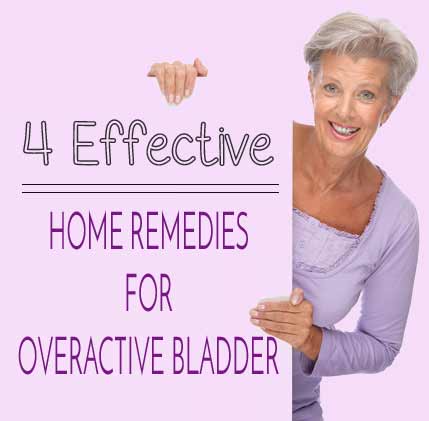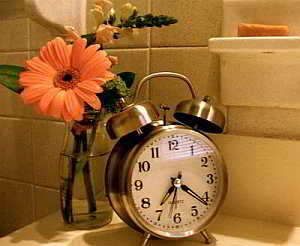4 Effective Home Remedies for Overactive Bladder
When you are struggling with a lack of bladder control after your hysterectomy, then it’s time to try these home remedies for overactive bladder.

Loss of bladder control after hysterectomy is often due to an overactive bladder and has the following characteristic symptoms:
- A sudden and overwhelming urge to go to the toilet.
- Not being able to hold and leaking small amounts of urine.
- The need to urinate (pee) more than 8 times a day.
- Several visits (more than 2) to the bathroom at night.
Studies show that women have an increased chance (40% to 60%) of developing urine leakage after hysterectomy surgery.
Some experience this immediately after the operation, but it can also happen many years later.
This blog is reader-supported. When you buy through a link on our site, we earn a commission at no extra cost to you. Read more
What is an overactive bladder?
There are several types of incontinence that can affect women after a hysterectomy; one is an overactive bladder.
When the bladder fills, nerves normally send a message to the brain that the bladder needs emptying. In turn, the brain will send a message telling the bladder to empty itself. With an overactive bladder, the bladder muscle (detrusor) simply squeezes too often. This can happen because of wrong nerve signals or bladder irritation.
Several overactive bladder medications are very effective. The downside of these medications is that they often come with unpleasant side effects. Many women stop taking these drugs mainly because of continuous headaches and gastrointestinal problems.
4 of the best home remedies for overactive bladder
But before you put yourself at the mercy of these drugs, it’s worth exploring more natural treatments for overactive bladder. Here are a few home remedies for overactive bladder relief to help you regain a healthy, functional bladder.
1. Yoga for overactive bladder

Yoga is one option when looking for home remedies for an overactive bladder. Stress is known to aggravate an overactive bladder. Yoga is often beneficial for pelvic wellness and regaining bladder control.
Yoga poses for overactive bladders help women build stronger pelvic muscles and become more conscious of their bladder area.
You can join pelvic wellness yoga classes in your area or do yoga poses for incontinence at home with the help of the Yoga for Optimizing Bladder Control DVD.
Doing stress-relieving yoga poses before bed will help you relax and guarantee a good night’s sleep.
2. Retraining an overactive bladder

Retraining the bladder is a home remedy for an overactive bladder that works for some women. This way, a woman can teach herself to hold her urine longer and control the urge to run for the toilet.
- Start by keeping a diary of how often and when you go to the bathroom.
- After three days, check the list and write down the shortest time you could hold your urine.
- Use this time as your starting point. Next time you feel the urge to go, try to find the strength and force yourself to add 10 minutes to lengthen this time.
- Try to stick to this schedule even if you do not feel the urge to go.
- Continue to add 10 to 15 minutes between your trips to the bathroom.
- Your goal is to delay until you can hold for three to four hours without accidents.
3. Kegel exercises for overactive bladder
Kegels, also known as pelvic floor exercises, will help you regain control over your pelvic floor muscles. These are the muscles that you contract to stop the urine flow. Combining bladder training and Kegel exercises has a high success rate in treating urge incontinence.
Dr. Arnold Kegel, a Californian gynecologist, discovered that you could exercise the pubococcygeus or pelvic floor muscle to improve its function and tension.
Women can learn through practice and persistence to regain control over their pelvic muscles. It takes some practice to master the technique of contracting the right muscles and persistence because it can take several weeks to months to see positive results.
4. Overactive bladder diet
To get better control over your urge incontinence, first of all, you need to make certain dietary changes, and second, try to manage your fluid intake.
What substances in your diet can affect your overactive bladder?
- Drink less coffee and tea as caffeine stimulates the bladder, and they have diuretic properties.
- Avoid acidic fruits and juices as they may irritate the bladder
- Carbonated drinks, alcohol, and beverages with artificial sweeteners may also upset an overactive bladder.
Foods that women with overactive bladder should avoid, the so-called trigger foods, include;
- Pickles, vinegar, and spicy foods
- Processed meats like sausages, bacon, and ham.
- Salty nuts and crisps
- Tomatoes or products made of tomato
- Onions
The best way to manage your fluid intake is to find a healthy middle way. Drink too little, and you will upset the bladder only more with highly concentrated urine. Drink too much, and you will keep running to the restroom. Recommended fluid intake for people with overactive bladder is 2 to 2.5 liters of fluid a day. If you must get out of bed to pee several times at night, limit your fluid intake after 6 pm.
Hopefully, these home remedies for overactive bladder will help you control your bladder. Like to share your story of overactive bladder problems after a hysterectomy, feel free to leave a comment in the box below.
Source: Mayoclinic, How the right diet can help an overactive bladder


It’s good to know that there are home remedies available to treat an overactive bladder in addition to any treatments suggestion by a urologist. I found it interesting to learn that diet can actually be a large factor in controlling bladder activity. I’ll be sure to mention to my wife and certain salted nuts and spicy foods are something she might want to avoid if she wants to start keeping her bladder under control.